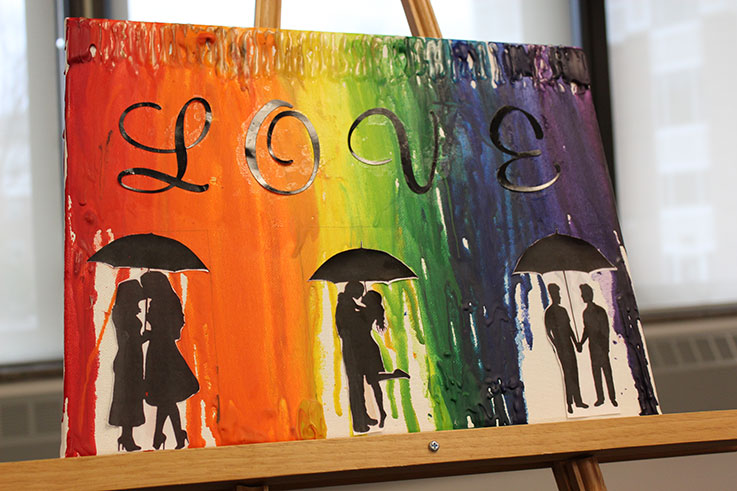
Office and meeting space for LGBTQIA+ students (photo by Alivia Adams’ 28)
LGBTQIA Support at IUP serves the entire IUP community, including students, faculty, and staff. LGBTQIA is the umbrella term for anyone who identifies as Lesbian, Gay, Bisexual, Transgender, Queer, Questioning, Intersex, Asexual, or Ally—anyone on the rainbow spectrum.
In collaboration with university offices and colleagues such as the Office of Social Equity and Title IX, LGBTQIA Support works to create a welcoming and supportive campus climate for all LGBTQIA individuals.
Our staff presents ally training in classes and for organizations. This training is designed for IUP faculty, staff, and students. It provides our campus community with a theoretical framework for understanding LGBTQIA identity, tools for involvement in diversity advocacy work, and global citizenship skills.

Learn More and Get in Touch
Interested in learning more about LGBTQIA Support at IUP? Send us an email to get started: lgbtqia-support@IUP.edu. or follow us on Instagram.
Important LGBTQIA Resources at IUP
Gender-Inclusive Housing Policy
Get Involved
- Pride Alliance at IUP is committed to fostering a safe and supportive academic and social environment regardless of sexual orientation, gender identity, or expression. To get involved, email Pride Alliance at prideallianceiup@gmail.com, or follow them on Instagram and Facebook.
- Colors in Unity at IUP works to create a radically inclusive, confidential, safe space for queer and transgender people of color to learn, be inspired, become empowered, and connect with each other. We provide a platform for students of marginalized racial, sexuality, and gender backgrounds. To learn more, follow them on Instagram.
- Transgender and Ally Group (TAG) offers transgender, gender non-conforming (GNC), and allied students a safe and accepting space to gather and connect. TAG provides on- and off-campus activities as well as educational resources with a focus on inclusion of trans and GNC individuals. To learn more about the club, follow TAG on Instagram: @tag.IUP
- Cro-Gay Club provides LGBTQIA+ students with a safe space to crochet and socialize. To learn more about their club, follow them on Instagram.
- You can always find other events on IUP's diversity calendar.
Celebrate Lavender Graduation
An IUP tradition since spring 2011, Lavender Graduation is an intimate opportunity for LGBTQIA-identified students and allies to be recognized for their accomplishments at IUP. Graduates from bachelor’s, master’s, and doctoral programs can also request lavender-colored cords to wear in the official university graduation ceremonies.
The Lavender Graduation Ceremony takes place during the spring semester each year. However, graduates from every term are welcome to request cords and to participate in the ceremony.
Other LGBTQIA Resources and Initiatives Across IUP
The LGBTQIA Commission is an advisory group to the Social Equity and Title IX Office as well as IUP's president. Comprised of IUP faculty, staff, and students, it’s designed to improve the climate for diversity within IUP and to specifically address issues affecting the welfare of LGBTQIA-identified members of the university community.
The minor in LGBTQ Studies, housed in the College of Humanities and Social Sciences, provides students the opportunity to critically examine diversity in sexual and gender identities. It’s designed to supplement all majors at IUP and provides valuable preparation for careers in all fields.
The LGBTQIA+ Housing Cluster, housed in Wallwork Hall since fall 2021, is open to those interested in living within a community of those who identify as LGBTQIA+. Contact the Housing office at IUP-Housing@IUP.edu if interested!
 IUP is an ally for LGBTQIA+ students (photo by Alivia Adams’ 28)
IUP is an ally for LGBTQIA+ students (photo by Alivia Adams’ 28)
Helpful Terms
“Sex”: biological and physiological characteristics such as chromosomes, hormones, and genitalia assigned at birth and used as a medical label.
“Gender”: the socially constructed roles, behaviors, activities, and attributes centered around notions of masculinity, femininity, and androgyny.
“Gender Identity”: the internal sense of gender which is not visible to others. One's gender identity may or may not align with one's assigned sex at birth.
“Sexual Orientation”: to whom one is sexually attracted. Gender identity and sexual orientation may affect one another, but they are not the same.
“Trans” or “Transgender”: an umbrella term for people whose gender identity or expression does not match the gender they were assigned at birth.
“Cisgender”: Someone whose gender identity matches the gender assigned at birth.
Health Information for the LGBTQIA Community
- Resources on sexual assault and the LGBT community from the Human Rights Campaign. As a community, LGBTQ people face higher rates of poverty, stigma, and marginalization, which puts us at greater risk for sexual assault. We also face higher rates of hate-motivated violence, which can often take the form of sexual assault.
- Resources from the Rape, Abuse & Incest National Network. Sexual violence affects people of every gender identity and sexual orientation. People who identify as part of the lesbian, gay, bisexual, transgender, and queer (LGBTQ) communities also experience sexual violence and may face different or additional challenges in accessing legal, medical, law enforcement, or other resources than other populations.
- A report of existing research on intimate partner violence and sexual abuse among LGBT individuals.
- Information on sexual assault stigma and myths within the LGBT community from the National Center for Lesbian Rights.
- Information on sexual harassment, abuse, and assault in the LGBTQ community from the Pennsylvania Coalition Against Rape.
- Sexual Violence and Individuals who Identify as LGBTQ: Guide for Transformative Prevention from the National Sexual Violence Resource Center.
- Resources from the Gay, Lesbian, Straight Education Network.
- A guide on Substance Abuse and Mental Health in the Transgender Community from Sunshine Behavioral Health.